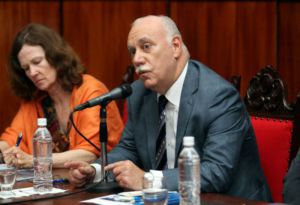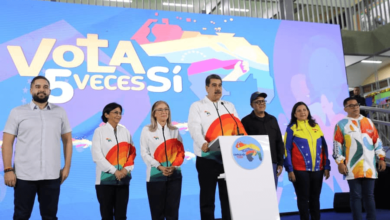
On Oct. 19, Venezuelan Supreme Court Magistrate Fernando Vegas Torrealba visited the ANSWER Coalition office in San Francisco to explain the Bolivarian Constitution and defend the revolutionary process begun under Hugo Chavez and carried on by President Nicolás Maduro. Justice Torrealba was the first vice president of Venezuela’s Supreme Court after being appointed by President Chavez in 2004 and is currently the president of the Electoral Board, a division of the court that oversees the election process in Venezuela.
Justice Torrealba first reviewed the highly democratic process that formed and enacted into law the Bolivarian Constitution. He noted that after Hugo Chavez was elected president in 1998, the first thing he did was to change the Constitution. Unlike the Constitution of the United States, which was written exclusively by wealthy, white, slave-holding landowners, the Bolivarian Constitution took shape after over 60,000 propositions from the Venezuelan people were submitted to the Chavez government and a vote was conducted to legitimize the Constitution as something that was truly of, by and for the people.
Also different from the decrepit and outdated Constitution of the U.S. is the Bolivarian Constitution’s dedication to human rights. Of the over 130 articles that make up the revolutionary Constitution, the majority are written to address special issues relating to human rights, such as nationality and citizenship, civil rights, political rights and public referenda, social and family rights, cultural and educational rights, economic rights, indigenous rights, and environmental rights.
Beyond the scope of human rights, the Bolivarian Constitution establishes communal councils, described as “an instance of participation, articulation and integration to operate among the various communal organizations, social groups and citizens, in order to exercise direct action on public policies and projects, and respond to the necessities and aspirations of the community for the construction of a society of equity and social justice.”
Tens of thousands of communal councils currently exist throughout Venezuela that are populated solely by unpaid community members, who can be elected to join as early as age 15, do not hold other elected positions, and are subject to recall by vote. These communal councils have their own bank where they are allocated funds by the State for community development projects and coordination purposes.
Justice Torrealba exemplified great pride in Venezuela’s elections but also warned of the implications of the violent right-wing opposition taking majority control of the government. Over 97 percent of the population is registered and the vast majority turn out to vote. The justice made a point that in the beginning of the revolutionary process the violent right-wing was in complete opposition to the Constitution but now uses it to win seats and even make false claims that the Chavistas aren’t abiding by it, adding even more legitimacy to the inclusiveness of the document itself for all Venezuelans.
Gloria La Riva, long-time Latin America solidarity activist and the 2016 presidential candidate of the Party for Socialism and Liberation, added to the importance of international unity with the Bolivarian Revolution, stating:
“All we hear in the Western media is that Venezuela is an economic basket case, and they blame it on the policies of Chavez and now President Maduro. But you can bet that if the right-wing government were to take power, we would see what has happened in so many other countries that have been overthrown or had their economies ruined and dominated by imperialism. The great oil wealth of Venezuela would be privatized and the statistics of poverty would go skyward, as they were before Chavez. There will be the cancellation of the Constitution and abolition of Congress as happened within 48 hours in 2002.”
With the National Assembly elections scheduled to take place on Sunday, Dec. 6, it is a crucial time to defend the Bolivarian Revolution and the constitutionally elected government of Nicolás Maduro, and to demand an end to U.S. government and media destabilization campaigns. Visit the website of the newly formed Cuba-Venezuela Solidarity Committee to receive news and updates from an anti-imperialist perspective and work with other organization around the world to galvanize public understanding and support of the two sister republics.
A video of Justice Torrealba’s talk can be viewed here.




